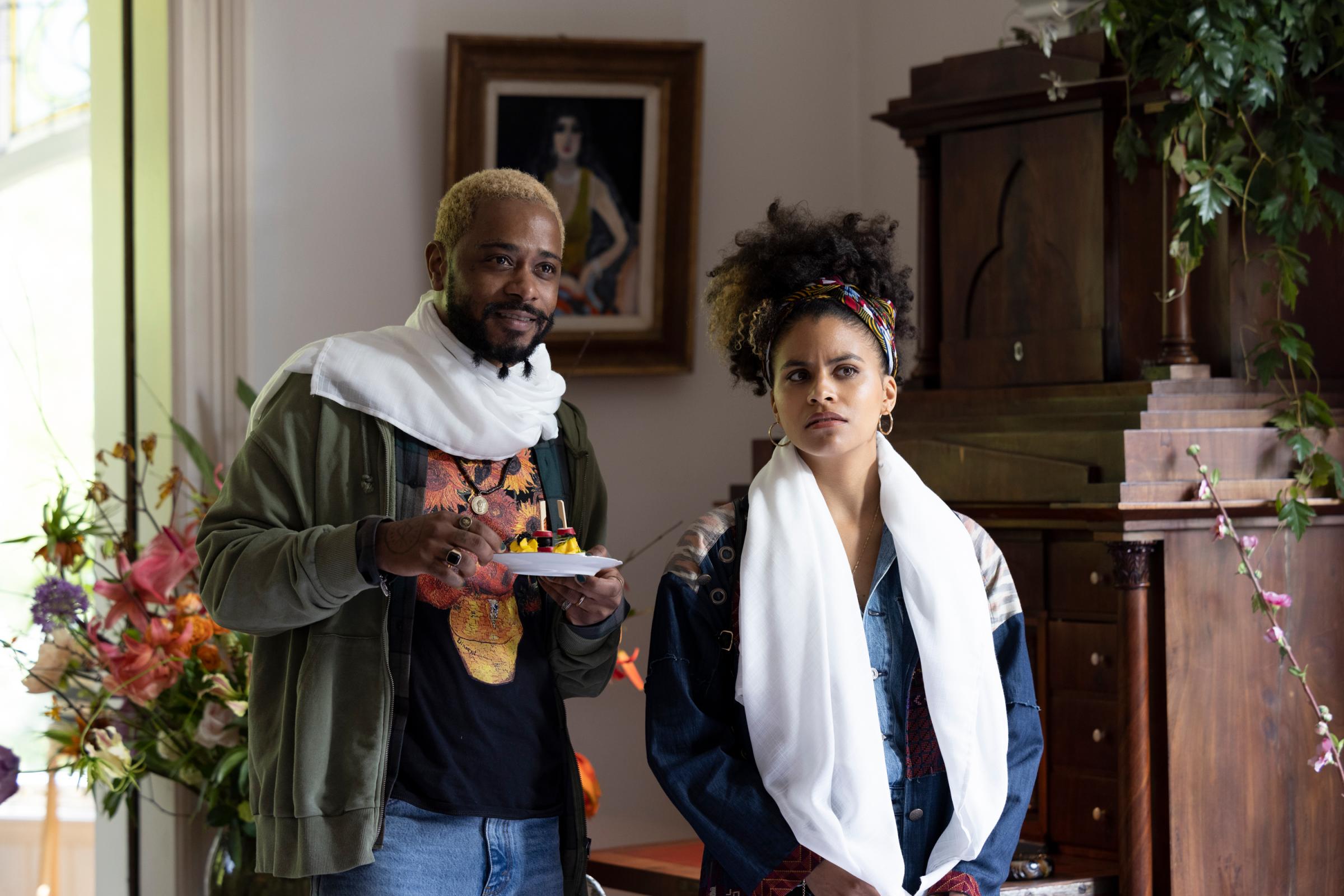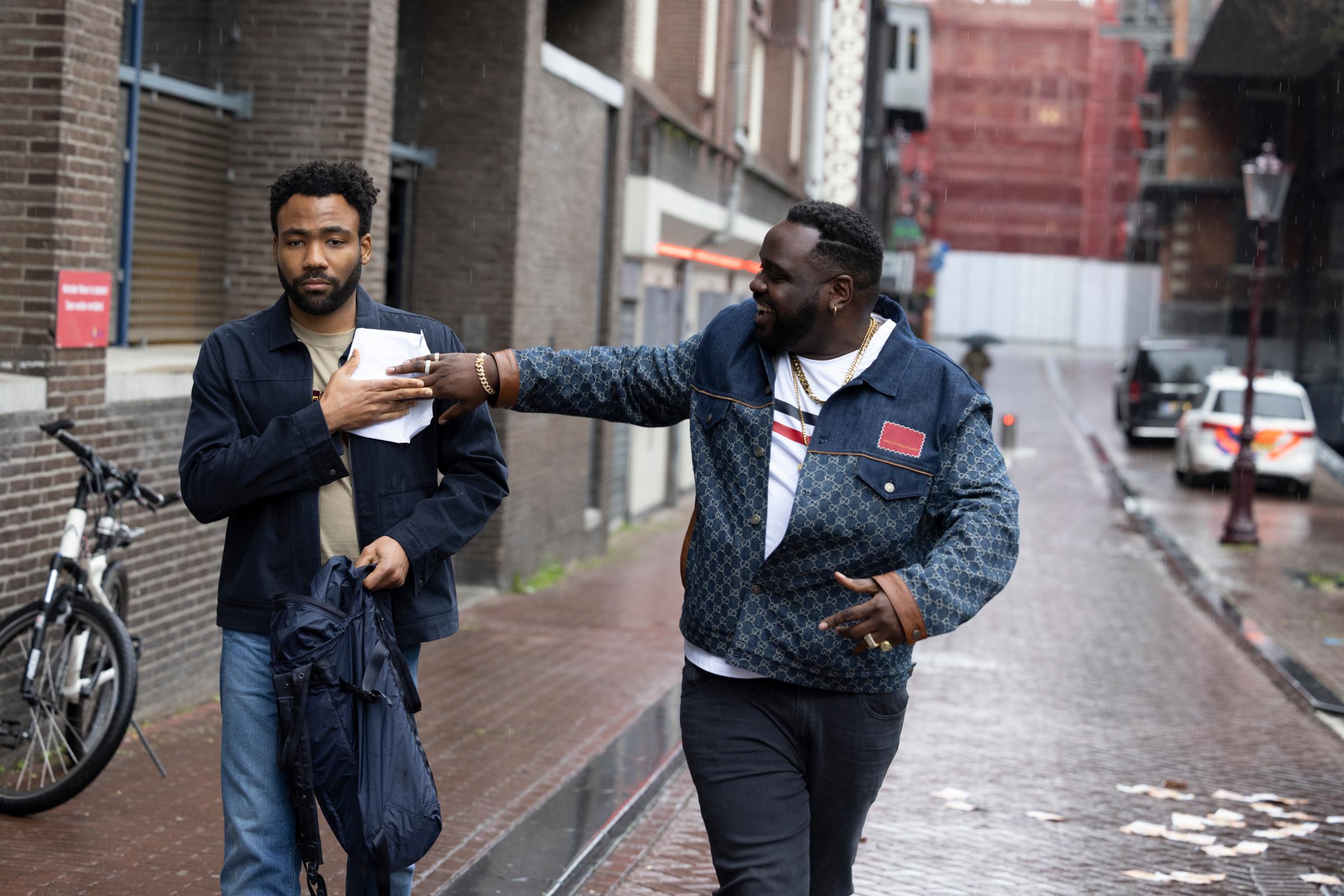Atlanta is a state of mind. In this uncanny realm, as sketched in the first two seasons of Donald Glover’s protean FX show, cars can be invisible, Justin Bieber can be Black, and a party at Drake’s mansion can be a metaphor for the churning emptiness of social media. And while Atlanta is also a very real capital city that spans some 130 square miles of northern Georgia, Atlanta the experimental masterwork, TV’s greatest surreal comedy, has no fixed location. Its incredibly auspicious third season, whose two-part premiere airs on March 24 and will be available to stream on Hulu the next day, takes place on a whole other continent, as Glover’s self-made manager Earn navigates his rapper cousin Alfred (Brian Tyree Henry) through a European tour.
But first: a standalone episode chilling enough to rival season 2 highlight “Teddy Perkins,” in which the series’ increasingly illustrious cast is all but absent.
“There are fairy tales to be written for adults,” wrote the French poet and leader of the original Surrealist movement André Breton in his first Surrealist Manifesto, from 1924. “Stories that are still in a green state.” The season’s opening salvo, “Three Slaps,” could be just such a fairy tale. Scripted by the creator’s brother Stephen Glover, whose growing list of classic episodes includes “Nobody Beats the Biebs” and last season’s upsetting middle-school flashback “FUBU,” it follows an elementary schooler named Loquareeous (Christopher Farrar) whose mom (Nicole Lockley) and grandfather (Timothy Tinker Sr.) are called into a meeting with the principal about the boy’s disruptive behavior. Although the problem is disciplinary, rather than academic, an ostensibly well-meaning counselor (Lauren Halperin) suggests moving him to remedial classes.
Once they’re out of the office, his mother scolds him: “If you don’t start using your common sense and acting right, these white people, they gonna kill you. Kill. You.” Then his grandfather gives him three comically light slaps across the face, as the counselor, a white woman, looks on. She walks him back to class, promising to get him out of a home she’s decided is abusive.

That same afternoon, Family & Children’s Services shows up at Loquareeous’ house to relocate him to the crumbling, kombucha-stinking home of a white lesbian couple, Gayle (Jamie Neumann) and Amber (Laura Dreyfuss), who’ve already adopted three other Black children. It’s a dreary place, where washcloths don’t exist, “fried chicken” is a flour-dipped drumstick nuked in the microwave and the kids tend a backyard vegetable garden as their moms supervise, in an unnerving echo of slavery. Eager to clap back at Rihanna for appropriating the term spirit animal but blind to their own escalating cruelty to the kids placed in their care, Gayle and Amber spiral. What’s clear is that these self-appointed saviors were woefully unprepared to support a family. “Everyone was so supportive,” Amber whimpers. “Every single person. And I just kept thinking: Why isn’t anyone stopping us?’” Loquareeous’ mom’s warning starts to sound like a prophecy.
Some aspects of the episode might raise certain viewers’ hackles. What, a progressive-minded Atlanta fan might wonder, do the brothers Glover have against lesbians? Or women? In fact, like so many of the show’s wildest premises, “Three Slaps” is based on real events. It hews surprisingly closely to the true horror story of Jen and Sarah Hart, a crusading white lesbian couple whose adoption of six Black children ended in a tragedy that should have been easily prevented. And even if it wasn’t drawn from life, the episode would be a haunting parable about the far-reaching implications of white supremacy. If certain scenes, like a hilariously over-the-top cold open that I wouldn’t dream of spoiling, poke fun at contemporary Hollywood’s monster-movie monetization of such issues, now that Get Out wannabes are everywhere, that too is quintessentially Atlanta.
The second half of an opening diptych directed by Glover’s cherished collaborator Hiro Murai, “Sinterklaas is Coming to Town,” is both more familiar than its predecessor and more surreal in its depictions of racism. It rejoins Earn as he awakens in a Copenhagen hotel room, next to a white woman who speaks no English, to the realization that he’s missed his flight to Amsterdam. He and stoner-sage Darius (a constitutionally laid-back LaKeith Stanfield) are accompanying Al on a European tour, presumably the same one the trio was preparing for in the season 2 finale that aired way back in the spring of 2018.
While that episode was the culmination of an arc that sent each of the characters on their own adventures, this one reunites them in a strange setting. Even Earn’s ex Van (Zazie Beetz, still wonderful) has flown in to join the crew in Amsterdam; aimless after failing to secure a job she’d wanted, she is, for once, the less stable of the two. Darius, who’s sent to pick her up at the airport while Earn rushes out of Denmark, makes the ideal companion for wandering a foreign city unmoored. Meanwhile, Earn caters to the endless incidental needs of his taciturn cousin, battling his own self-destructive habits by becoming an ingenious problem solver on Al’s behalf.

Atlanta rarely gets the credit it deserves for the strength of its more conventional storytelling, but this kind of character and relationship development is what grounds the show, keeping viewers invested in more than just individual high-concept episodes and outlandish gags. It eases the transition from Van and Darius shopping for coats to Van and Darius embarking on a wild goose chase that ultimately involves a dying man who Darius immediately becomes convinced is Tupac, and from Earn and Al glimpsing traditional Dutch blackface in the form of Santa’s supposedly soot-caked helper Black Pete to Earn and Al seeing blackface everywhere they go.
Surreal is an overused term in arts criticism, often stretched so far that it ends up describing a tone that is merely dreamy or awkward. But what Glover does in Atlanta, and especially in the new season—whose promotional art is a group portrait of Earn, Van, Al, and Darius rendered in a style that splits the difference between two European titans: Picasso and original Surrealist Salvador Dalí—genuinely resembles Breton’s definition of Surrealism as “psychic automatism in its pure state, by which one proposes to express… the actual functioning of thought.” The idea is that the subconscious, unmediated by logic or analysis or facts, offers the most authentic likeness of reality as we experience it. For example, the season’s second episode riffs on the typical American liberal’s idealization of European life. A scene in an Amsterdam prison (that vaguely echoes A$AP Rocky’s incarceration while on tour in Sweden) paints it as a paradise, with big, nicely furnished private cells equipped with flat-screen TVs, where guards take inmates’ meal orders from a menu. Is that what it’s really like to be behind bars in a country that treats criminals as humans? Not likely. What resonates, as both absurd and poignant, is the fantasy.
Grounded in reality but untethered by conventional thinking, surrealism makes an especially effective tool with which to address Atlanta’s most consistent subject: race. A horrific news story can haunt the subconscious, in slightly altered form, as a literal nightmare. A Black musician touring Europe is not literally going to be confronted by blackface everywhere he turns, but he will almost certainly be confronted, at each stop, with some heretofore unknown form of racism. “Beloved imagination,” Breton wrote, “what I like most about you is your unsparing quality.” Unsparing is, among others, the right word to describe these two conjoined episodes, if not the show as a whole. It justifies the persistence of Atlanta, an entire ocean away from Atlanta.
More Must-Reads from TIME
- Cybersecurity Experts Are Sounding the Alarm on DOGE
- Meet the 2025 Women of the Year
- The Harsh Truth About Disability Inclusion
- Why Do More Young Adults Have Cancer?
- Colman Domingo Leads With Radical Love
- How to Get Better at Doing Things Alone
- Michelle Zauner Stares Down the Darkness
Contact us at letters@time.com